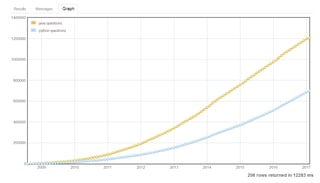I am trying to get the number of questions associated with a specific tag for a particular date range. I initially assumed the fromdate and todate parameters would do this. However, it appears that filters based on the creation date of the tag itself. So not what I want.
It appears I could use the /search route to do this, using a query like:
/search?fromdate=1420070400&todate=1454025600&sort=creation&tagged=python
This is not ideal because I am trying to get ~2k tags, month by month, over a few years so I will quickly hit the rate limit.
I want to get how many questions of a particular tag were created every month for the last five years, this is 60 unique date ranges. I want to do this for ~2k tags. So with the available syntax of the search route I would need to make ~120k requests.

